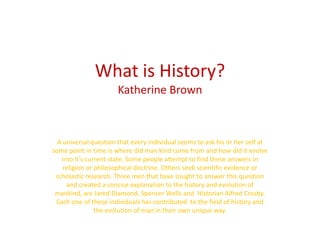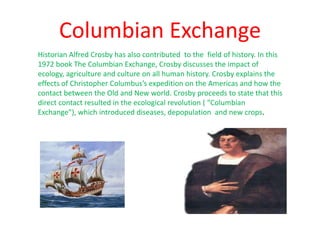What is history powerpoint
- 1. What is History?Katherine Brown A universal question that every individual seems to ask his or her self at some point in time is where did man kind come from and how did it evolve into it’s current state. Some people attempt to find these answers in religion or philosophical doctrine. Others seek scientific evidence or scholastic research. Three men that have sought to answer this question and created a concise explanation to the history and evolution of mankind, are Jared Diamond, Spencer Wells and Historian Alfred Crosby. Each one of these individuals has contributed to the field of history and the evolution of man in their own unique way.
- 2. Guns, Germs and Steal Jared Diamond is the author of the award winning book Guns, Germs and Steal., where he explains the history of humanity over the last 13,000 years. He also explains Eurasian hegemony throughout history (www.Wikipedia.org). Diamond began writing this book with a question asked by a man from Papua New Guinea, more than 30 years ago. The man’s question motivated Diamond to find out why were Europeans the ones to conquer so much of the planet. Also why didn’t the Chinese, or the Inca become the masters of the globe and lastly, why did farming never emerge in Australia. Diamond combines elements of ecology, archaeology, genetics, linguistics and other various historical case studies to support his evidence. One of Diamond’s main focal points in Guns, Germs and steal is that Eurasian landmass gave it’s human inhabitants the advantage over other societies on other continents, which in time they were able to dominate and conquer. Diamond concluded that environmental differences created environmental determinism, which essentially determines which culture will survive.
- 3. Columbian Exchange Historian Alfred Crosby has also contributed to the field of history. In this 1972 book The Columbian Exchange, Crosby discusses the impact of ecology, agriculture and culture on all human history. Crosby explains the effects of Christopher Columbus’s expedition on the Americas and how the contact between the Old and New world. Crosby proceeds to state that this direct contact resulted in the ecological revolution ( “Columbian Exchange”), which introduced diseases, depopulation and new crops.
- 4. The Journey of a man: A Genetic Odyssey Spencer Wells is famous for his unorthodox theory of the evolution of mankind. Wells wrote a book called the Journey of a man: A Genetic Odyssey. Wells wrote that 60,000 years ago we began descending from a single man who lived in Africa . He proceeds to state that modern human evolution and migration began from Africa. Wells explains that genetic data has been used to trace human migration over the past 50,000 years (www.wikipedia.org).



